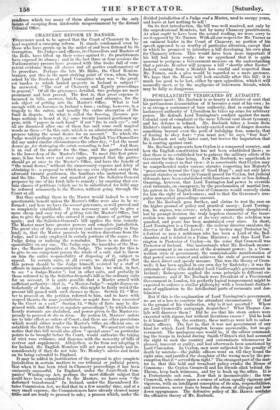PUSILLANIMITY VINDICATED BY AUDACITY.
Exrnsams meet : Mr. Roebuck is so hearty a detester of cant that his pertinacious denunciation of it becomes a cant of his own ; he is so strong a contemner of bare authority, that in combating the hackneyed authority of Liberalism he takes up arms for arbitrary power. He defends Lord Torrington's conduct against the mere Colonial cant of complaint or the mere Liberal cant about tyranny; and his defence is refined. Mr. Roebuck takes a lesson from Richter's timid man, whose keenly-excited sense of danger descries something beyond even the peril of indulging fear, namely, that of fearing to obey fear : " you must not," he says, " fear fear." Mr. Roebuck not only hates cant, but braves the imputation that he is canting against cant. Mr. Roebuck represents how Ceylon is a conquered country, and how the English constitution has not been established there ; so that there is no established law to gainsay the military edicts of its Governor for the time being. Now Mr. Roebuck, we apprehend, is not strictly correct in that view : it is conceivable that Ceylon may be comprehended under various statutes respecting her Majesty's "possessions beyond the Cape of Good Hope " ; and not only have special statutes or orders in Council passed for Ceylon, but judicial tribunals have been established with functions more or less defined. Granting, however, that Lord Torrington had power to override civil tribunals, on emergency, by the proclamation of martial law, his patron in the English House of Commons would scarcely claim for him the right of lawlessness ; and to that the Governor's irre- gular unreported proceedings amount.
But Mr. Roebuck goes farther, and claims to rest the case on the higher ground of policy and practical mercy : Lord Torring- ton, he argues, was severe ; rebels were summarily slaughtered; but by prompt decision the truly hopeless character of the insur- rection was made apparent at its very outset; the rebellion was quashed, and peace has been maintained ever since. In short,. Lord Torrington is a Cromwell : the railway director emulates the director of the Bedford Level; if " a brewer may Protector be,' a fortiori so may a nobleman who has been a Lord of the Bed- chamber and is related to a Prime Minister ; and thus Lord Tor- rington is Protector of Ceylon—in the sense that Cromwell was Protector of Ireland. One understands what Mr. Roebuck means.: all government is an exercise of the dominantpower • in a Crozn- wellian style of government, the unmistakeable manifestation of that power saves contest and achieves the ends of government in the most direct and speedy manner. This was the theory of Crom- well; it has been applied in our own day by Radetzky ; it was the rationale of those who defended Lord Castlereagh's government in Ireland ; Robespierre applied the same principle to different cir- cumstances ; and if Mr. Roebuck were President of a Provisional Government in London, his perfectly logical temperament might be expected to enforce a similar philosophy with a trenchant distinct- ness of application to the intellectual parts of recusants and doe- trinaires.
But if this is the explanation of Lord Torrington's government, we are at a loss to construe the attendant circumstances. If that is the ground of his vindication, why is it not asserted ? Where are Lord Cromwell's autograph despatches ? What Thomas Car- lyle will discover them ? Did he see that his stern orders were executed with rigour, but without licentious excess P Did he look to it himself ? On the contrary, these matters were left to subor- dinate officers. The fact is, that it was not government of any kind for which Lord Torrington became answerable, but no-go- vernment. The analogous case would be, if the officer command- ing the troops in Ireland during Smith O'Brien's riot had assumed the right to sack the country and exterminate whomsoever he pleased, innocent or guilty, and had afterwards been sanctioned by Lord Clarendon. In Ceylon, men were subjected to the penalty of death by mistake—the public officers went on till they found the right man, and justified the slaughter of the wrong men by the pre- sumption that it " servedthem rit." The strangest part of the mat- ter is, that this bold and trenchant policy evades the House of Commons : the Ceylon Cromwell and his friends slink behind the Throne, keep back witnesses, and try to hush up the affair. It is a Protectorate sub mat. Now that is inconceivable : the true Cromwell, who enters upon a course of action eivally rigorous and vigorous, with an intelligent conception of its aim, responsibilities, and resources, never fears to breast the storm of obloquy and bear down oppugnance. The defensive policy of Mr. Hawes
the offensive theory of Mr. Roebuck.


























 Previous page
Previous page